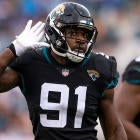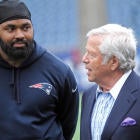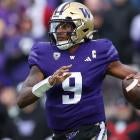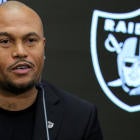The franchise tag is a powerful management tool that restricts a team's best free agent in a given year from entering the open market regardless of whether he is a true marquee player. It can also hinder the ability to gain long term security. Most players prefer a chance to test the open market over receiving a franchise player designation. The tag has been characterized as a high salaried one-year "prove it" deal, where the risk of serious injury and poor performance must be incurred again after completing a contract when a multi-year agreement can't be reached.
A new trend has started developing over the last couple of years that's a win-win situation for the franchise player and the designating team. Franchise player trades are on the rise. There hadn't been a franchise player trade in nearly a decade until the Dolphins dealt wide receiver Jarvis Landry to the Browns in 2018. Three franchise player trades occurred last year.
Below is a chart detailing the more recent franchise player trades and the last ones before these types of transactions started increasing.
Player | Position | Year | Old Team | New Team | Compensation |
Frank Clark | DE | 2019 | Seahawks | Chiefs | 2019 1st rd pick (29th) & 2020 2nd rd pick; Swap of 2019 3rd rd picks |
Jadeveon Clowney | DE | 2019 | Texans | Seahawks | 2020 3rd rd pick, OLB Jacob Martin & OLB Barkevious Mingo |
Dee Ford | DE | 2019 | Chiefs | 49ers | 2020 2nd rd pick |
Jarvis Landry | WR | 2018 | Dolphins | Browns | 2018 4th rd pick & 2019 7th rd pick |
QB | 2009 | Patriots | Chiefs | 2009 2nd rd pick; Chiefs also get LB Mike Vrabel | |
| Jared Allen | DE | 2008 | Chiefs | Vikings | 2008 1st rd pick (15th) & Two 2008 3rd rd picks; Swap of 2008 6th rd pick |
Corey Williams | DT | 2008 | Packers | Browns | 2008 2nd rd pick |
All of the players besides Jadeveon Clowney signed long term deals with the acquiring team at some point during the offseason of the trade. In fact, most of the transactions were a "tag and trade" where a new contract was negotiated in conjunction with the player acquisition.
In every instance, the trade compensation was less than the two first-round picks required to be relinquished when a franchise player signs an offer sheet that isn't matched. The last franchise player to switch teams for the full compensation was Joey Galloway in 2000 when he went from the Seahawks to the Cowboys.
A majority of the acquisitions took place at the beginning of league year when the trading period opens. Since there haven't been any franchise player trades so far this year, the timing with such acquisitions may be similar to when Frank Clark was dealt. Clark's trade occurred two days before the 2019 NFL draft began. He received a five-year, $104 million contract with $62.305 million of guarantees ($43.805 million fully guaranteed at signing) in the process. This year's draft starts on April 23.
The Texans created a blueprint of how not to trade a franchise player with Clowney. Waiting until after the July 15 deadline for franchise players to sign long term passed and that limited the Texans' trade compensation. Clowney wasn't traded until the end of last preseason. Other teams were only going to give up so much for Clowney when there was potential for him to be just a one-season rental because he could only sign a one-year deal. The Texans also agreed to pay $7 million of Clowney's $15 million one year salary as a signing bonus to help facilitate the trade.
To ensure that he would hit the open market this year, Clowney received a clause prohibiting an acquiring team, the Seahawks, from designating him as a franchise or transition player when his one year contract expired. Before Clowney, a franchise player hadn't received a tag prohibition clause since defensive tackle Albert Haynesworth with the Titans in 2008.
In hindsight, Clowney may have been better off if he didn't have the clause considering he remains unsigned. It would have been interesting to see whether Seattle would have used a designation on him. The 2020 defensive end franchise and transition numbers are $17.788 million and $15.184 million respectively.
An unsigned franchise player can have influence over his destination. Since a player with an unsigned tender can't be traded until under contract, he essentially has veto power on where he is being dealt or at all. This gives the player a de facto no-trade clause. Clowney was able to quash a trade to the Dolphins by refusing to sign his tender for a move to Miami.
The franchise player most likely to be dealt is Jaguars defensive end Yannick Ngakoue. He has made it abundantly clear he has no interest in signing a long term deal to stay in Jacksonville. Ngakoue's relationship with the Jaguars soured during acrimonious negotiations for a contract extension last offseason. Ngakoue had a brief training camp holdout, which primarily came to an end because of the need to earn another accrued season (i.e.; a year of service towards free agency).
Under the NFL Collective Bargaining Agreement rules in existence at the time, Ngakoue wouldn't have earned a fourth one if he had waited until there were less than 30 days before the NFL's first 2019 regular season game to report to the Jaguars. Four accrued seasons are necessary to achieve unrestricted free agent status when a player's contract expires.
The Jaguars are driving a hard bargain to deal Ngakoue. The Jaguars reportedly want a first-round pick and other considerations for him. This is understandable considering how Jacksonville was rewarded by being patient in trading disgruntled cornerback Jalen Ramsey last season. The Rams gave the Jaguars a 2020 first-round pick (20th overall), a 2021 first-round pick and a 2021 fourth-round pick for Ramsey.
An acquiring team will be hard-pressed to sign Ngakoue to a multi-year contract that doesn't put him in the $20 million per year pass rusher club, which currently has five members (Khalil Mack -- $23.5 million per year, Aaron Donald -- $22.5 million per year, DeForest Buckner -- $21 million per year, DeMarcus Lawrence -- $21 million per year, Frank Clark -- $20.8 million per year). Ngakoue's 37.5 sacks during his four NFL seasons are two more than Clark had at the same point in his career. Lawrence has 38 sacks when combining the four best seasons of his six-year NFL career. Since Ngakoue just turned 25, he'll likely be looking for a deal that would allow him to potentially hit the open market when he is in his late twenties.
There is skepticism about the Chiefs being able to keep defensive tackle Chris Jones long term because most teams don't have two high priced pass rushers. The Chiefs would be extremely top heavy by making a commitment to Jones since quarterback Patrick Mahomes, the 2018 NFL MVP, could become the league's first $40 million per year player before the regular season begins.
The Chiefs reportedly have had contract discussions with Jones' representatives but haven't made a contract offer yet. The two sides weren't close in negotiations last offseason.
The Chiefs making a major investment in a pass rusher last offseason that had never done anything for the franchise in Clark probably didn't sit too well with Jones after the type of 2018 season he had. Jones set an NFL record by posting a sack in 11 straight games and was third in the league with 15.5 sacks. An encore performance in 2019 was always going to be a difficult task. Despite missing three games with a groin injury, Jones still had nine sacks.
The 49ers trading Buckner to the Colts for a 2020 first-round pick (13th overall) complicates matters for the Chiefs. The four-year, $84 million extension averaging $21 million per year Buckner received from the Colts will likely be an important data point to Jones. Buckner's deal contains $56.378 million in guarantees, of which $39.378 million was fully guaranteed at signing. The Buckner trade compensation should be relevant if the Chiefs decide to move Jones.
The Chiefs were $171 under the salary cap before creating $5 million of cap space in wide receiver Sammy Watkins' renegotiation where he took a pay cut for that same amount. A long term Jones deal would surely lower his 2020 cap number from his $16.126 million franchise tender that's counting for the Chiefs. A trade would free up $16.126 million of cap room since Jones' tender would no longer be on Kansas City's books.
Conventional wisdom suggested that the Ravens would only franchise outside linebacker Matthew Judon, whose tender is $15.828 million, to trade him. The Ravens' history with franchise players suggests otherwise. The three players the Ravens gave franchise tags to under the previous CBA (defensive tackle Haloti Ngata-2011; running back Ray Rice-2012; kicker Justin Tucker-2016) signed long term deals. The Ravens reportedly will listen to trade inquires about Judon.
The salary floor for a long term deal with Judon, who earned his first Pro Bowl berth last season while setting a career-high with 9.5 sacks, is probably the deal his former Ravens teammate Za'Darius Smith got from the Packers in free agency last year. Smith signed a four-year deal averaging $16.5 million per year. In the event that the Ravens move Judon, compensation similar to the second-round pick the 49ers gave up for Dee Ford would seem appropriate.
The Patriots putting a franchise tag on offensive guard Joe Thuney wasn't expected. An offensive guard hadn't been given a franchise tag since the Patriots used one on Logan Mankins in 2011 until this year.
Thuney potentially could have become the NFL's highest-paid interior offensive lineman on the open market if recent history is any indication A Pro Bowl caliber guard in his prime has been re-setting the market in free agency (Andrew Norwell, Kelechi Osemele, Kevin Zeitler). The current standard is the four-year, $56.55 million extension averaging $14,137,500 per year Brandon Brooks received from the Eagles during the middle of last season. Although restricted, Brooks' deal could still be a benchmark for Thuney.
Trading Thuney would give the Patriots some much need salary cap relief because his $14.781 franchise tender would no longer be counting. According to NFLPA data, the Patriots have just over $1.075 million of cap room, which is 31st in the NFL. The most the Patriots could expect if Thuney left via free agency next year would be a compensatory third-round pick in 2022. A comparable pick in this year's draft might be considered reasonable compensation to New England if parting ways with Thuney.





















